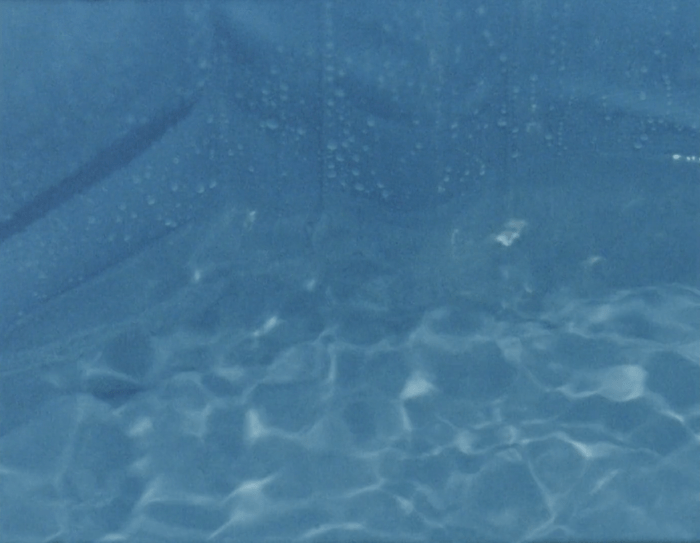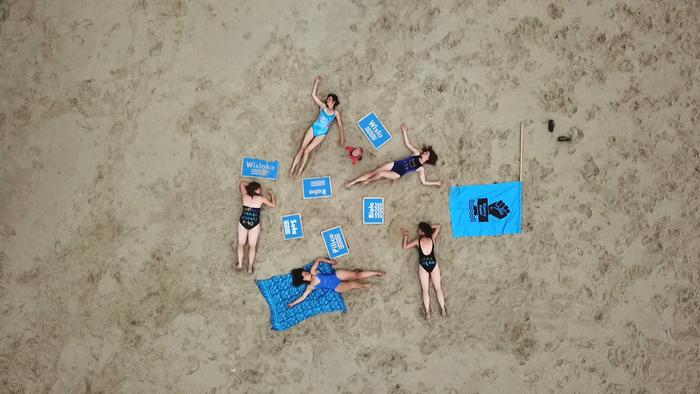
Still from On being and Bathing (16mm film, 09.26, 2021) Anna Ulrikke Andersen and Abi Palmer.

Still from On being and Bathing (16mm film, 09.26, 2021) Anna Ulrikke Andersen and Abi Palmer.
Still from On being and Bathing (16mm film, 09.26, 2021) Anna Ulrikke Andersen and Abi Palmer.
Their house is always filled with buckets, basins, jars and containers of all kinds. This odd type of hoarding is visible particularly in the garden, bathrooms and of course the kitchen. Here, a deep and wide bowl permanently fills the sink, making sure water droplets don’t sneak away down the drain while washing dishes. Instead, they mix with the mysterious residue water, which becomes murky with the rinsed remnants. This isn’t something one would see in the houses shown on the TV in the adjacent room.1 Undisturbed, grandma always gathers this weird mixture, carries it to the bathroom and fills a bigger bucket next to the toilet, which is used for flushing. In the same room, she keeps a wider basin to collect the soapy residue that drips off during showers. The collected solution is later used to clean the house floors.
My grandfather too has his frugal peculiarities. The fact that he sticks to one teacup throughout the day rarely evokes my emotions, but I always find it a bit unsettling to see him add the second course to the deep plate right after the soup. Despite the explanation that everything mixes in the stomach anyway, there is something weirdly disturbing about it. Other rituals I've observed, which are unusual for most households, include using the residue from eggs and potatoes to nourish plants and storing boiled water in jars to avoid ever buying any bottled liquids.
Yet most of the house containers, particularly a manifold of aged plastic buckets, are best visible in the garden. Spreading along the house gutters and across the trampled lawn, they are carefully laid out to catch raindrops. Grandpa uses the accumulated liquids to water the garden and grandma to wash her hair, as she finds it softer than tap water. Through this constellation of buckets, a garden hose winds, connecting a hand-dug well with a tall retention barrel. Such intricate garden infrastructure is not common in the neighbourhood. Thus, the effort my grandparents dedicate to all these inconvenient acts in a time and place of apparent abundance of comfort is even more striking to me. Could their actions be in fact homemade watery activism?
1 See Turner D., “He Draws Himself a Bath”, Metode, 2024, vol. 2 ‘Being, Bathing and Beyond’
The types of human relationships with water may stem from various premises. Respectful positions toward this elusive element can evolve from cultural practices, be driven by critical theories and a deep-seated sense of decency, or simply be dictated by economic necessities. There is an undeniable link between the frugal acts of gathering water and the lack of privilege to acquire it easily. It is an unwitting paradox that while being the most elementary substance for the existence of most earthly entities, it is far from being the most attainable one. It seems banal but necessary to point out that 60 to 90 per cent of human bodies and the body of the blue planet itself is constituted of water. Therefore, as feminist scholar Astrida Neimanis puts it, we are primarily “bodies of water in a watery world”.2 And yet, despite the equality of the internal-watery nature, human bodies don’t have equal access to the planetary hydro-commons. External factors such as appearance, skin color, geographical origin, and socio-economic status play a significant role and can determine whether individuals have ample access to resources or if they must struggle to meet their daily needs.
Apart from making up our bodily tissues, water “infiltrates and inhabits the vapour we breathe, the land we work, the animal, vegetable, meteorological and other earth others with whom we share this planet”.3 It has facilitated our living conditions across centuries and co-created the idea of comfort through access to hygiene, food preparation, sewage, or recreation possibilities. Simultaneously, it was the key substance that evoked the postulated necessity to erect bridges, prevent floods and elevate dwellings above its grasp. Ironically, while nurturing and accommodating, water also holds the power to harm and take lives due to its excess or scarcity, especially when considering the environmental challenges related to climate change.4 Clearly, oceans, seas, rivers, and other watery realms that provide solace and mitigate stress, are themselves becoming troubled spaces. They are harnessed by dams, physically and chemically manipulated, inundated with microplastics and xenoestrogens, polluted and disregarded —a stark contrast to their allegedly pristine counterparts treasured in plastic bottles, commodities that fuel the rituals centred around paid consumption.
Inquiries concerning water should emphasize the disparities and societal challenges linked to its accessibility, as well as the troubling alterations in water’s materiality. Evidently, the consequences of these changes vary, with a disproportionate impact on underprivileged communities. Hence, this unequal aquatic landscape, shaped by capitalistic mechanisms of control and the climate crisis, desperately calls for reconfigurations. Viewing these aspects through the lens of comfort may provide a fresh perspective. Considering the problematic relationship of discomfort and pleasure may lead to new imaginings and prompt necessary questions.
What is the price of water, and who holds the authority to determine it?
Who can take it for granted, and who needs to pray for its presence?
How can the standards of comfort and pleasure be recalibrated?
Where is the line between essential rituals and excessive indulgence?
How can access to water be redistributed, nurturing both local needs and global climatic requirements?
2 Neimanis A., Bodies of Water: Posthuman Feminist Phenomenology, New York, Bloomsbury, 2017. p. 65
3 Ibid.
4 See Koepnick L., “On Water’s Edge”, Metode, 2024, vol. 2 ‘Being, Bathing and Beyond’
I wonder to what extent my grandparents’ actions can be considered political. Having been brought up in post-war eastern Poland, they might have simply developed their humble practices out of necessity and lack of other options. Perhaps their frugality arose amidst scarcity, and when they moved away from the less affluent countryside, they carried it with them. Nevertheless, this deep-seated commitment to not wasting anything has never ceased to fascinate me. It survived political and economic changes, guiding them through the new capitalist world without compromising their principles. And even in contemporary Poland, the western privilege of comfort is still not available to everyone, as around 2.3 million Poles in 2021 still lived in a house without a bathroom.5
The culture of gathering water may be an active exercise of humility. Unlike grandiose gestures proudly undertaken to bring salvation to the troubled planet, the practices of discomfort incorporated into the domestic lives of my grandparents don’t seek recognition. Their political agency seems to be primarily about how they perceive and respond to the everyday, yet deeply environmental, conditions of the present and the future, perhaps without fully recognizing it as such.
Although my grandparents are not frequent readers of the works by eco-feminist and posthuman thinkers, their humility towards the bodies of water can be read as genuine post-anthropocentric activism. In their case it doesn’t require a statement to be political but it may definitely be taken as such. From my point of view, their position doesn’t focus on fixing the world, but it might offer a helpful strategy to fixing our minds.6 Shifting ones attention toward what’s uncomfortable and activating a new material-discursive relationship with water might be a telling example of how ordinary individuals can confront the everyday situations around them.7 Engaging in ethical behavior and making environmentally responsible choices, even when faced with discomfort, may be a way towards fulfilment and a more meaningful life.
For me such an idea of a good life is pretty hard to swallow. I think about the excitement of having a bathtub during my summer job in the United States or while visiting friends in Sweden. I would indulge in baths that lasted for hours. It was a relief and an uplifting experience—a suspension of time and routines, a connection with the senses. It brought me to wonder how such pleasure can be achieved in the world of comfort-scarcity. Trying to relate my own personal story to the laborious lives of my grandparents, I have decided to join the conceptual and methodological search for new tools to carefully engage in the watery worlds. I’m interested in alternative ways of thinking about water and embodied practices that could activate radical imaginations and construct new modes of inhabiting our blue planet. Perhaps it could help to build frameworks that can reshuffle our understanding of what’s pleasant or desired. This could mean accepting and cherishing ways of living with watery otherness, transcending differences in aesthetics, examining, and expanding practices of bathing, or finding comfort beyond usual routines. What fascinates me is bringing to light figurations that embrace a material-discursive relationship with water, having both conceptual and worldliness power.8 Some might appear seemingly distant from my grandparents’ agenda, but address the complexity of our ecological and political reality. One such unexpected gem is the whimsical idea of mermaiding.
5 According to the National Population and Housing Census 2021.
6 David W. Orr, Earth in Mind: On Education, Environment, and the Human Prospect, Washington, DC: Island Press, 2004.
7 Alaimo S. Bodily Natures: Science, Environment, and the Material Self, Indiana University Press, 2010.
8 Following Astirda Neimanis, “Figurations are keys for imagining and living otherwise, but unlike a concept unfettered by the world we actually live in or as, figurations are importantly grounded in our material reality”. Neimanis A., Bodies of Water: Posthuman Feminist Phenomenology, New York, Bloomsbury, 2017, p. 7; For more discourse on figurations as material-semiotic knots, see: Haraway, D. When Species Meet, Minneapolis: Minnesota University Press, 2007.
Mermaiding is a practice based on engaging the water as mermaids, mermen, or other genders of merfolk. At its core, the activity is a way of seeking pleasure in positive ecospheric emotions despite being submerged in the myriad crises. The appearance of human bodies is temporarily transformed to merge with the nonhuman world in the ritual of wearing, and often swimming in, a costume comprising a mermaid tail. This practice integrates elements of free diving, swimming, craftsmanship, folklore, and ecological awareness related to marine environments. It serves as a form of creative play, an aesthetic statement, a means of self-expression, an identity, and a way of engaging with the world. Involvement with the figure of the mermaid can manifest as a recreational pursuit, a hobby, or even a vocation. Professionals within the mermaiding domain engage in aquatic performances and are highly present in online communities. Meanwhile, non-professional enthusiasts indulge in mermaiding activities in permissible environments such as local pools, lakes, rivers, and seashores, participating in gatherings, celebrations, or large conventions such as mermagicons.

Courtesy of Mermaid Citrine
This form of being in water has been embraced by a diverse range of individuals all across the world.9 There is an allure in the sense of escapism and fantasy that mermaids represent. On a planet plagued by war, illnesses and social turmoil, many merfolk have found life in the water a refuge. Away from the chaos of life on land, the mer-world might offer a kinder and more joyful alternative, where one can be whoever and whatever one wants to be. For this reason, enthusiasts adopt mersonas with particular names and personal philosophies, crafting tales of becoming aquatic beings. These transitional figures, embodying both human and aquatic traits, resonate especially with individuals existing on society’s periphery, at the fringes of what is considered typically human. For those whose bodies and identities are often labelled as excessive, undesirable, or unnatural, mermaiding can be an act of resistance. Capable of attracting humans of all shapes, genders, and backgrounds to experience joy, freedom, and community—mermaiding can offer a temporary utopia that challenges established societal norms. The allure of these aquatic embodiments might lay in their ability to create moments of respite, even if fleeting, from prevailing expectations—a new take on how to seek water-induced pleasures.
Diving deeper, mermaid-figures as aquatic humanoid creatures, dissolve the dichotomy between human and nonhuman and embody the notion of trans-corporeality, rejecting any attempts of categorisation, fragmentation, or reduction.10 Sensory estrangement, experienced as an altered body in an unfamiliar environment, positions conceptual displacement as a method of defamiliarization, making our terrestrial orientations particularly visible. Enlivening the materiality of bodies, particularly the overseen ones—such as of those of aquatic and nonhuman nature, but also the bodies of women, queer, trans, and disabled folk)—may facilitate our collaborative environmental efforts. Such methodology draws inspiration from Donna Haraway’s refusal to disjoint discourse from materiality and leads us to recognize our human selves as both agents and disruptors.11 Thus, amidst an accelerating climate crisis, the hybrid mermaid also inevitable gestures toward a critique of humanity and its influence on the world. The mermaid figure holds the potential to disrupt the hierarchical and ecologically disastrous category of the human, particularly one whom is “white, straight, male, able-bodied, propertied, rational, individual, and sovereign, [...] the only genre within a diverse array of humans validated and entitled to power”.12 It might lead us to understand that the fate of the other-than-human world and that of humans are inextricably linked. In this way, the practice of mermaiding can manifest a political, hydro-feminist movement towards the Seasterhood, in which welfare is redistributed to all species, races, classes, genders, sexual orientations, ethnicities and any other embodied realities.
9 Gelineau K., Growing ‘mermaiding’ subculture making a splash around the world, The Press Democrat, 2022. www.pressdemocrat.com/article/news/growing-mermaiding-subculture-making-a-splash-around-the-world/
10 See: Trans-corporeality. in: Braidotti R., & Hlavajova M., Posthuman glossary, London. Bloomsbury, 2018.
11 Haraway D., Staying with the Trouble. Experimental Futures, Durham, NC, Duke University Press, 2016.
12 Davis J., “Crossing Merfolk, the Human, and the Anthropocene in Nalo Hopkinson’s The New Moon’s Arms and Rivers Solomon’s The Deep”, Journal of the Fantastic in the Arts, Pocatello, 2021.
Observing mermaiding myself, I find similarities between this peculiar activity and my grandparents’ approach. Despite clear differences, they can both be viewed as aesthetic practices. The notion of wearing a tail, particularly one that boasts lively colors and gleaming scales, still strikes me as somewhat unusual. It’s clear why such an image might spark wonder, curiosity, or doubt. However, it offers an alternative within the aesthetic realm that fulfils a specific purpose; aiming for a deliberate unfamiliarity, fantasy, or science-fiction that can bring to light hidden potentialities. The mermaid’s aesthetic questions what is commonly accepted, well-seen and desired. Similarly, my grandparents reject the commodified aesthetics of water, grappling instead with its impurities in their daily lives. They have grown accustomed to using an array of buckets, encountering residues, and being surrounded by the lingering smell of remnants as they handle water that is anything but crystal clear. Even when its quality is murky, visibility obscured, and color shifted to an earthy hue, they humbly acknowledge its value. I can see that, much like the practice of mermaiding, they dare to challenge conventional notions of desirability and opt for an alternative approach, endorsing the concept of ‘aesthetics of reuse.
This signals to me that to reimagine comfort, we might need to explore novel ways of engaging aesthetically with water and fostering a post-comfort sensibility. Drawing on the principles of new materialism, it can be argued that sustainable and equitable futures cannot mimic the visual qualities inherent in existing and harmful paradigms. Hence, we might need to reconfigure what we aesthetically desire, normalising the impure, reused, ‘in progress’, fluid, wet and living.13 By embracing this concept in our bathrooms, kitchens, gardens, as well as within our communities, both urban and rural, there is potential to reimagine the fundamental aspects of our planetary habitation and convert these areas into what can be termed ‘post-comfort waterscapes.’
13 See a parallel discourse of the phenomenon of revived environmental aesthetics: Epidermitecture Hudec A., Zaidenberg B., “Epidermitecture: Co-Existing on the Surface”, Metode, 2023., vol. 1 ‘Deep Surface’
Transitioning from the clean and impermeable to water-affirming landscapes may benefit even more from heightened political engagement, extending aqua-activism beyond domestic realms and into the public. On that level retaining and recreating waterscapes is a pivotal response to planetary climate challenges, including water depletions in droughts, heatwaves and decreasing aquatic biodiversity. The fundamental approach is to retain water within ecosystems through natural mechanisms facilitated by wetlands, marshes, and meandering rivers. Advocating for these principles, polish artist Cecylia Malik initiated the feminist collective River Sisters in 2018. Using her feminine and maternal identity, she sheds light on the significance of urban waters, wild rivers and renaturalization of the already regulated watercourses in the context of the climate crisis. By involving numerous women in the project and allowing them to embody chosen and beloved rivers and streams, Malik underscores the importance of care and effort. She suggests that humans should grant voices to bodies of water and renounce the disproportionate and unfair comfort they experience, particularly compared to less privileged and oppressed Earthly entities.

Frame from the film ‘Siostry Rzeki’ (River Sisters). Courtesy of Cecylia Malik

Frame from the film ‘Siostry Rzeki’ (River Sisters). Courtesy of Cecylia Malik
The River Sisters’ artistic efforts have turned into a nationwide campaign defending Polish rivers against the construction of new dams and regulations that could heavily disrupt the water-bed ecosystems. Their ecofeminist activities involve events where participants actively represent bodies of water. They hold blue banners with the names of the rivers, mimicking the commonly used river signs in Poland, and gather on riverbanks to sing folklore-inspired watery hymns in their defence. In addition, the River Sisters have orchestrated a collective female boat journey along most of the Vistula River, documenting and engaging with its banks along the way. They have also arranged outdoor catwalk shows in major cities along the river, featuring the upcycled swimsuit collection “Fashion for Rivers.” All these hydrofeminist efforts initiated by the collective stem from passionate and unpaid activism outside regular working hours.14
The application of post-comfort philosophy in these initiatives is rooted in feminine care, courage, collective strength, and the alignment of the elemental force of water with the female body. The River Sisters confront the challenge of bringing attention to a frequently overlooked topic in public discourse through artistic expression and collective efforts. In the predominantly male-dominated arena of water management in Poland, including politicians, engineers, and construction workers, they establish a counterbalancing community of woman-identifying artists, scientists, and activists. Embracing the motto “When the river is free, we women will also be free,” they advocate for ecological maternal care, defending the emancipation of aquatic ecosystems and the right of rivers to flow freely, retain self-regulation, and self-purify through meandering. This includes embracing swampy aesthetics untouched by the human inclination to control to maintain a more lasting ecological equilibrium, even if it means foregoing (short-lived) comfort.
14 See the film documenting the hydroactivist endeavours of the River Sisters curated by Cecylia Malik: vod.greenfestival.pl/v/siostry-rzeki,274.html?sad=8ebe7271c1a2
I admit that I’m still navigating the hydrosensual attempts to comprehend our more-than-human environmental identity, and that there are further ideas in this realm worth exploring. Nonetheless, the few reorientations mentioned so far helped me better understand what the titular waterscapes could mean, both at the scale of riverbeds and of our homes. Consequently, I believe, that embracing post-comfort relationship with water might be realised very differently in diverse sociocultural contexts and in different parts of the world. Perhaps, rather than ethics or restrictions, in the age of abundance we might need new motivations. One of them, as in the context of my grandparents, could be coining a new definition of waste, that truly scrutinizes its value, in relation to water, but also to other elements. We can use design as a tool to make post-comfort aesthetics desired and embraced, outside of the logic of unbridled capitalism. To reimagine the architectures and landscapes that we collectively inhabit we should look for beauty (and salvation) in the infrastructures of frugality, residues, remnants, swamps and overgrowths. It might be beneficial to this approach to study the perspectives of other Earthly Kin, which, as in the practice of mermaiding, might detach us from human arrogance and bring us closer to a humble and inclusive understanding of being part of a much larger ecology.
What seems to come forward from the examples discussed here is also that we have the power to choose the rituals that shape how we engage with the world. Recognizing the critical significance of systemic transformations, I don’t intend to romanticize individual responsibility in addressing climate mitigation. But perhaps instead of subscribing to the capitalist status quo, we might want to develop new ideas of how we as humans can act in this world, and how the world can act on us. In my understanding, both the actions of the River Sisters and the frugal dailyness of my grandparents are forms of such reshuffling, and therefore political activism. As we need a multitude of approaches to address our planetary circumstances, bringing ourselves out of certain habits and cultivating new ones might also be a form of protest. Particularly those that bridge the pleasant and uncomfortable, familiar, and unfamiliar. However subtle, they are nevertheless a valid way of embracing our current situation and actively ‘staying with the trouble’. In this way, through enduring discomfort, opacity, and uncanniness, they can help us develop a sense of kinship with the world we inhabit, including its unique nature-cultures, multi-species dwellings, and situatedness. I believe that focusing on material agency, lived experiences, and corporeal practices can be of planetary importance, despite remaining at the scale of our daily habits. It might lead us to reconsider the unquestioned privileges of comfort and our reassurance that we have the solutions to everything that unfolds. By living closer with the water, letting go of control and embracing humility, we can act meaningfully, in spite of our reach and limitations. Just like the dripping water that hollows out stone, not through force but through persistence.
“There is a lot of teaching from this essay – it teaches us the practice of generational gratitude in ways to understand our shared environmental identity through watery activism; mermaiding and embodying rivers. I liked that the essay started from values instilled by the author’s grandparents.
The re-evaluation developed with the concept of “growing-with-the-trouble,” that underlines the need to adapt within both global and local ecologies, embracing discomfort that comes with them, and sharing resources and environments with other actors and beings, particularly those other-than-human, could be elaborated. How can “growing-with-the-trouble,” embracing discomfort and sharing resources and environments with other actors and beings, particularly those other-than-human underline the need to adapt within current global and local ecologies?”
“Apart from his thoughts on discomfort, I am most intrigued by the scale at which Jakub writes. Expanding from a very personal anecdote to engage with a larger context on activist approaches to water rights (and water’s rights), Jakub moves from the micro to the macro in effortless ways. This not only speaks to his thought process, but also outlines a methodology where the writing and theme parallel each other in approach – a strategy that I hope I share in my writing as well.”
Jakub Węgrzynowicz, “Post-comfort waterscapes. Navigating pleasure and discomfort.,” Metode (2024), vol. 2 ‘Being, Bathing and Beyond’